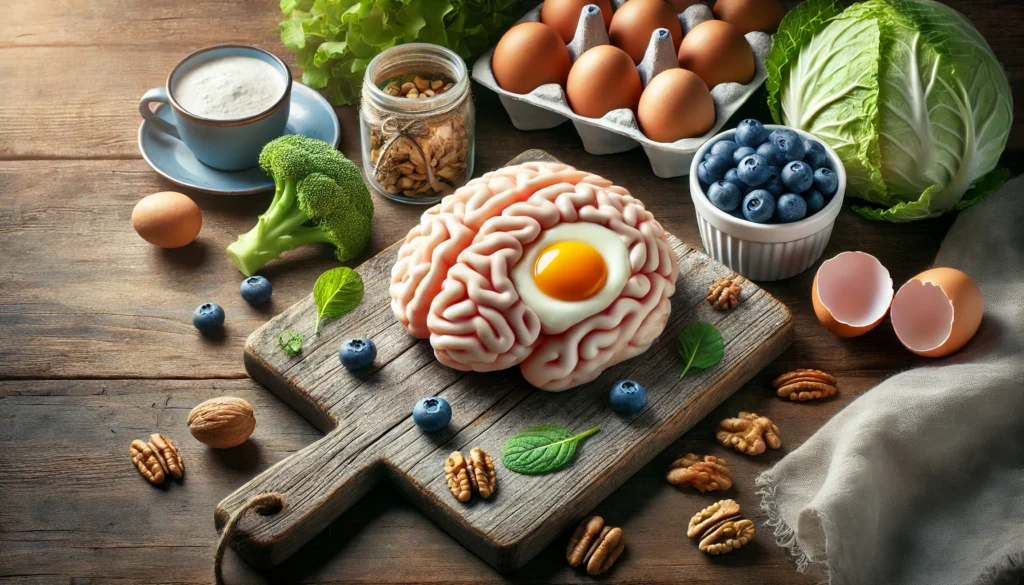Cognitive Resilience and the Brain-Protective Potential of Eggs
Cognitive resilience refers to the brain’s ability to maintain function despite age-related changes or disease. This concept is central to understanding why certain seniors experience less cognitive decline than others, even when exposed to similar risk factors. Nutritional interventions are among the most promising strategies for enhancing resilience, and the consistent consumption of nutrient-dense foods like eggs can play a significant role. This is especially pertinent given that many older adults face barriers to achieving dietary adequacy due to socioeconomic limitations, appetite loss, or comorbid health conditions.
Eggs deliver a potent package of bioavailable nutrients in an inexpensive, easy-to-prepare form. Their ability to support various neural processes—from neurotransmission to antioxidant defense and methylation—positions them as a foundational food in the cognitive health strategies of aging adults. As more research underscores the modifiable nature of cognitive aging, eggs deserve a place in broader discussions on dietary patterns and public health policies for older populations.
You may also like: Best Brain Foods for Focus, Memory, and Longevity: What Science Says
Emerging Evidence from Clinical Trials and Longitudinal Studies
The past decade has witnessed a surge in human trials and longitudinal studies exploring the dietary determinants of brain aging. Eggs are increasingly being evaluated not in isolation, but within the context of overall dietary patterns such as the Mediterranean and MIND diets, both of which are associated with slower cognitive decline and reduced risk of neurodegenerative diseases.
These diets emphasize whole foods rich in brain-supportive nutrients—an umbrella under which eggs clearly fall. Although few studies have isolated eggs as a single intervention, their inclusion within these broader dietary frameworks reinforces their relevance. For example, in studies measuring dietary choline intake, individuals in the highest consumption quartile—many of whom regularly consumed eggs—had significantly better cognitive performance and reduced dementia risk. These findings challenge outdated dietary guidance that discouraged egg consumption in older adults due to cholesterol concerns.
Additionally, eggs are increasingly being examined for their impact on mood disorders in seniors. Depression and anxiety are common among older adults and are closely linked to cognitive performance. Choline and B12, abundant in eggs, support neurological function and mood regulation, suggesting that eggs may offer dual benefits for both emotional and cognitive well-being.

Bioavailability, Food Matrix Effects, and Nutrient Synergy
An often-overlooked concept in nutrition science is the idea of the food matrix—the complex interplay between nutrients and non-nutritive compounds within whole foods that affects absorption, metabolism, and health outcomes. Eggs offer a highly bioavailable source of key nutrients, and the natural fat content in yolks enhances the absorption of fat-soluble compounds like lutein and zeaxanthin.
This makes eggs a more efficient delivery system than supplements alone. For example, the bioavailability of lutein from eggs is higher than from vegetables due to the lipid matrix, which facilitates absorption in the digestive tract. In this sense, the synergy between fats, proteins, and micronutrients in eggs may amplify their cognitive benefits.
Moreover, combining eggs with other brain-supportive foods—such as leafy greens, berries, and whole grains—can create a synergistic effect that enhances overall neuroprotection. These interactions underscore the importance of viewing eggs not as isolated agents but as integral components of a broader, balanced dietary approach that addresses the multidimensional nature of brain aging.
Practical Considerations for Incorporating Eggs into a Senior’s Diet
Despite their benefits, some older adults may have concerns about including eggs in their diet. These often stem from outdated notions about cholesterol or unfounded fears of adverse cardiovascular effects. It is important to contextualize these concerns within the framework of contemporary science, which indicates that for most people, moderate egg consumption—up to one egg per day—is safe and beneficial.
Practical strategies for incorporating eggs include pairing them with vegetables for breakfast, adding boiled eggs to salads or soups, or blending them into nutrient-rich casseroles. For seniors with chewing difficulties, soft preparations like scrambled eggs or poached eggs can offer both ease of consumption and nutrient density. It’s also worth noting that eggs are often well tolerated even among those with diminished appetites, making them ideal for small, frequent meals.
For caregivers and health practitioners, emphasizing the science behind the cognitive benefits of eggs can help shift dietary behaviors in older adults who may otherwise be hesitant. Given the rising prevalence of age-related cognitive disorders, even small, consistent dietary changes can yield significant long-term benefits.
Eggs, Brain Food, and the Role of Public Health Messaging
Public health campaigns have historically struggled to balance simplicity with scientific nuance. Eggs were once caught in the crossfire of well-intentioned but overly simplistic dietary messages aimed at reducing cholesterol intake. As a result, many older adults internalized the belief that eggs were unhealthy, leading to widespread avoidance during crucial decades of cognitive aging.
Today, the narrative is shifting. A more balanced understanding of cholesterol metabolism, coupled with mounting evidence on the neuroprotective qualities of egg nutrients, is helping to rehabilitate their reputation. Public health messaging now needs to catch up with the science by promoting eggs as part of a brain-healthy, anti-aging diet.
This requires a culturally sensitive and accessible approach, especially for communities where eggs are a dietary staple or where access to other nutrient-rich foods may be limited. By reinforcing the message that eggs are good brain food—particularly for seniors—health educators can empower individuals to make informed, proactive choices for cognitive longevity.

Frequently Asked Questions: Eggs and Cognitive Health in Seniors
1. Can eating eggs every day really benefit cognitive performance in older adults?
Yes, incorporating eggs into a daily diet may offer measurable cognitive advantages for seniors. While the article outlines key nutrients like choline and vitamin B12, what’s less discussed is the cumulative effect of nutrient consistency. Seniors often experience variability in their diets due to appetite changes or limited food access. Eggs provide a consistent and reliable source of essential nutrients that help maintain baseline cognitive performance. This consistency helps stabilize neurotransmitter synthesis, which supports executive functions like focus, decision-making, and memory retention.
2. How do eggs support brain health beyond choline content?
While choline is critical, the eggs and brain connection extends beyond this one nutrient. Eggs also supply selenium and iodine, trace elements essential for brain metabolism and thyroid function—both of which influence cognitive energy levels. Furthermore, eggs contain lecithin, a phospholipid that contributes to membrane integrity in brain cells, enhancing their ability to communicate efficiently. These additional factors highlight why eggs are good for your brain, especially in preserving structural and functional aspects of aging neurons.
3. Are there psychological benefits tied to eating eggs regularly in later life?
Surprisingly, yes. Regular consumption of eggs may influence mood and emotional resilience, indirectly impacting cognitive health. Eggs contain tryptophan, an amino acid that contributes to serotonin synthesis—a neurotransmitter associated with mood stabilization. In seniors, maintaining emotional well-being is crucial, as depression and anxiety are linked to faster cognitive decline. So when we ask what do eggs do to senior brains, the answer includes not only cognitive preservation but mood regulation, which are deeply interconnected.
4. Do the methods used to prepare eggs affect their impact on brain health?
Absolutely. How eggs are cooked can influence their nutrient availability. For instance, overcooking can degrade sensitive nutrients like B vitamins, while pairing eggs with healthy fats (like olive oil) or antioxidant-rich vegetables can enhance their neuroprotective effects. Poaching and soft-boiling are optimal methods for preserving nutrients. Thus, to maximize the benefits of eggs brain food, thoughtful preparation matters just as much as frequency of consumption.
5. Are eggs good brain food for seniors who have prediabetes or insulin resistance?
Yes, eggs can be especially beneficial for older adults managing blood sugar issues. They have a minimal impact on glycemic load and are known to support stable blood sugar levels throughout the day. Since glucose fluctuations are linked to cognitive fatigue and memory lapses, eggs help mitigate these episodes. Additionally, the protein-fat matrix in eggs slows digestion, leading to sustained energy—a valuable attribute when considering how eggs and brain function interact in metabolically vulnerable populations.
6. What role do eggs play in supporting seniors who are recovering from neurological injury or stroke?
During post-stroke rehabilitation or recovery from brain trauma, nutrient-dense foods can aid in neural repair. Eggs provide not just protein but also omega-3 enriched versions (from hens fed flaxseed) that deliver anti-inflammatory benefits crucial for healing brain tissue. Moreover, the combination of choline, B vitamins, and antioxidants found in eggs helps re-establish neurotransmitter pathways. For seniors in cognitive recovery, this makes eggs a practical, easily digestible intervention that aligns with brain health objectives.
7. Can the cholesterol in eggs harm brain health in aging adults?
Current research shows that for most seniors, the cholesterol found in eggs does not increase cardiovascular or cognitive risk when consumed in moderation. In fact, cholesterol is a key structural component of brain cells and is necessary for the synthesis of hormones and vitamin D, both of which affect brain function. It’s a misconception that dietary cholesterol equates to cognitive harm. When assessing whether eggs are good for your brain, it’s important to recognize that cholesterol plays a nuanced, and often beneficial, role in neural physiology.
8. Are there synergistic foods that enhance the cognitive benefits of eggs?
Yes, combining eggs with certain foods can amplify their brain-boosting potential. For instance, pairing eggs with leafy greens rich in folate supports methylation pathways that choline is also involved in. Whole grains add B vitamins and fiber, enhancing energy metabolism and gut-brain signaling. Even fermented foods like yogurt can contribute probiotics that improve nutrient absorption and reduce inflammation. In the context of eggs brain food, synergy with other dietary components is key to maximizing benefits.
9. How do cultural and socioeconomic factors influence the role of eggs in senior nutrition?
Eggs are one of the most affordable sources of high-quality protein and brain-relevant nutrients, making them accessible across diverse populations. In many cultures, eggs are already a dietary staple, offering a culturally appropriate vehicle for nutrition interventions. Public health initiatives that promote eggs and brain health together can bridge economic and cultural gaps in cognitive care. When evaluating what do eggs do to senior brains in a global context, affordability and cultural fit enhance their utility.
10. What are the future directions of research on eggs and cognitive aging?
Emerging research is exploring how bioactive peptides in eggs might modulate inflammation and oxidative stress in the brain. Additionally, nutrigenomic studies are beginning to examine how individual genetic profiles influence response to egg-based nutrients, particularly choline metabolism. Future clinical trials may evaluate the long-term impact of egg consumption on specific cognitive domains like verbal memory or processing speed. As science evolves, the question “are eggs good brain food” will likely expand into more personalized and precision-based nutrition models.

Final Thoughts on Eggs and Cognitive Longevity
The conversation around cognitive aging is evolving, and with it, our understanding of how everyday foods influence long-term brain health. Eggs, once maligned for their cholesterol content, are now recognized as a source of several key nutrients that directly support neural integrity. From choline and vitamin B12 to lutein, zeaxanthin, and high-quality protein, the nutritional components of eggs form a compelling case for their role in the cognitive health of seniors.
When we ask, “are eggs good for your brain?” or ponder the deeper implications of “what do eggs do to senior brains?” the answers increasingly point to neuroprotection, neurotransmitter support, and reduced risk of cognitive decline. Eggs are not a panacea, but they are a powerful ally in a multifaceted approach to brain health. Their affordability, accessibility, and culinary versatility make them especially valuable for aging populations seeking practical ways to maintain mental clarity and independence.
The growing body of evidence supports the idea that eggs are good brain food, not only for their direct nutrient contributions but also for the broader dietary patterns they enable. In the context of anti-aging and cognitive enhancement, eggs deserve renewed attention—not just as breakfast fare, but as a cornerstone of strategies aimed at preserving brain function and enhancing quality of life in the later years.
As we look to the future of brain health interventions, the answer to the question “are eggs good brain food for seniors?” appears to be a confident yes—provided they are part of a thoughtful, balanced, and evidence-based dietary lifestyle that respects the complexities of both nutrition and the aging brain.
brain nutrition for seniors, healthy aging diet, cognitive decline prevention, foods that support memory, senior brain supplements, neuroprotective foods, aging and mental clarity, nutrient-rich diets for elders, memory-enhancing foods, senior wellness nutrition, brain-supportive nutrients, anti-aging brain strategies, natural cognitive boosters, mental sharpness in aging, diet and brain aging, healthy brain aging tips, memory support for elderly, senior dietary recommendations, brain cell protection foods, everyday foods for brain health
Further Reading:
Egg consumption linked to slower cognitive decline in women
Egg intake moderates the rate of memory decline in healthy older adults
Disclaimer
The information contained in this article is provided for general informational purposes only and is not intended to serve as medical, legal, or professional advice. While Health11News strives to present accurate, up-to-date, and reliable content, no warranty or guarantee, expressed or implied, is made regarding the completeness, accuracy, or adequacy of the information provided. Readers are strongly advised to seek the guidance of a qualified healthcare provider or other relevant professionals before acting on any information contained in this article. Health11News, its authors, editors, and contributors expressly disclaim any liability for any damages, losses, or consequences arising directly or indirectly from the use, interpretation, or reliance on any information presented herein. The views and opinions expressed in this article are those of the author(s) and do not necessarily reflect the official policies or positions of Health11News.


